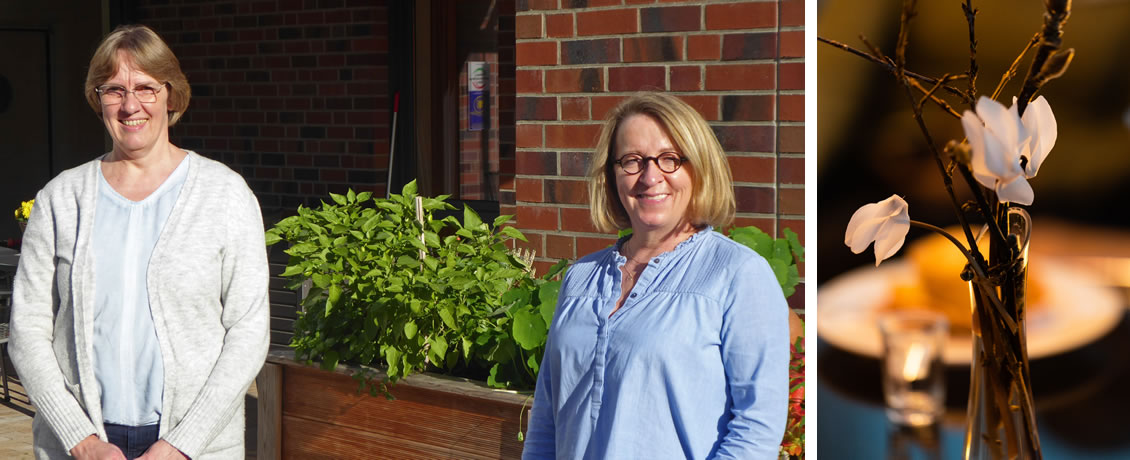
“We live on human contact” – How Corona Changes Everyday Life at the Hospice
When entering the villa at Hohenzollernring you will be received by the smell of freshly baked cake. Wherever you are just coming from, it feels like coming home. At once, you will realize a cosy, homey atmosphere. In spite of Corona.
Barbara H. (in her mid-fifties) has been living in Johannes-Hospiz for a couple of months. She is one of the residents with a longer stay. H. suffers of cancer, as most of the residents here do. “When I came here, nobody knew how the disease would develop. It is a present for me to still have such a long time”, she says. All who live here are for the most part very restricted in their capacities. There are good and bad days, H. says. “Today is rather a bad day.” And you can see how talking saps on her strength.
Nurse Monika Christen and her colleagues try daily to adapt the nursing care individually to the residents’ state of health. For them and their relatives every wish shall be fulfilled if possible, “and most of the time it works out”, Christen says. The smell of cake which has now arrived in the living room on the first floor, is part of the house as the furnishings are, Christen says. Every day, bread and cake will be baked.
About 30 volunteers help with the kitchen work and the evening care and are there for the residents and their relatives. “We missed them very much, for they make many things possible”, Christen says.
The pandemic does not stop in front of the hospice, although everything is done to not let the residents feel that. “I feel safe here. I know that they all take care and have everything under their control”, Barbara H. says. If she is afraid of the virus? “We all know why we are here. Yes, I am on my way, but I don’t want to die of Corona”, she says.
For safety’s sake there is a duty to wear masks – which makes a great difference, as Christen says. “We live here on the human contact to our residents and the face mask creates a distance.” Apart from the duty to wear mask there are practically no restrictions, which the residents directly feel, but for a rather drastic one: the limited number of visitors. As Johannes-Hospiz has only room for ten residents, planning visits has, it is true, been a challenge, but never been impossible, as Astrid Hückelheim, deputy head of the hospice, points out. “Visits were never forbidden. In March, two visitors a day were allowed, one in the morning and one in the afternoon. Now it is four visitors within 24 hours.” In March, however, the colleagues reached their limits, “although we knew, that because of the size of our institution we were in a privileged situation”, Monika Christen says. “If you had to explain the situation to the relatives, it was very difficult, because we understood the wishes of the relatives only too well.” But there was always a solution. The colleagues even put up with private restrictions in order to protect the residents. “But when a party is planned and too many people are expected to be close together, you simply do not go there”, Christen says. “And that is why we are incredibly grateful”, Barbara H. says.
She saw many residents come and go. “That is very sad.” But also consoling: “I know that the nurses know what they do.” For her family as well it is a relief to know that she is in good hands. That is what their task is, Astrid Hückelheim and Monika Christen say. And they fulfill it every day, in spite of Corona.
Renée Trippler, published in Westfälische Nachrichten 22/10/2020
Fotograph/subtitle: Astrid Hückelheim (left) and Monika Christen

